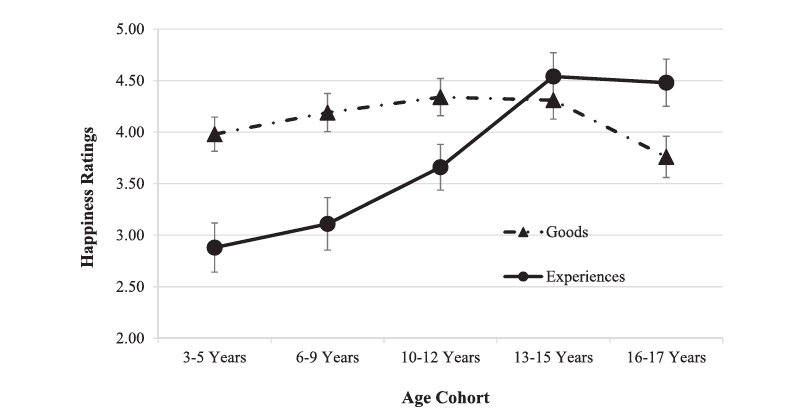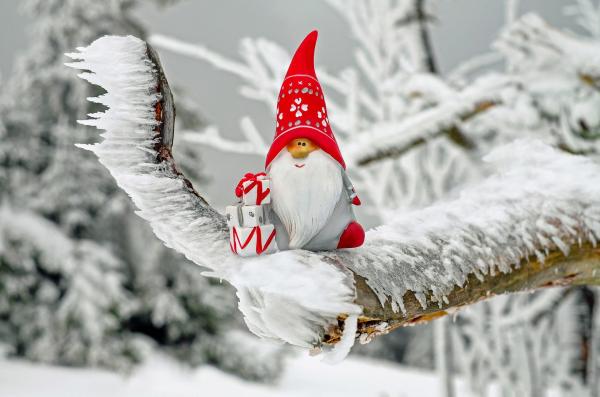The dilemma of what to give becomes more difficult, especially for family and friends I have gifted over the years. There is something of a cliché in giving cookware to a spouse; even worse, in my mind, giving cash or gift cards to someone to whom I am close – seems, and is, so impersonal. The new study divides gifts into two types, objects, and experiences. It turns out that as we grow older, experiences become more important than objects.
The marketers studied children, ages 3 to 17, using various means to identify which presents brought the most joy to their hearts. Both the objects and experiences being determined age-appropriate beforehand. To those unsure of the category's definition, a trip to Disney World is an experience, the stuffed Mickey, an object. Here in a picture is what they found.

You needn't get too concerned about the methodology (see citation if you must), but you can see that experience triumphs over goods at about age 13 to 15, but not completely. Marketers have done quite a bit of research on adults; after all, we have the money to spend, and we too, find experiences bring more joy than material objects.
Why?
The researchers believe two developments in cognitive growth are the source of the changing preferences. There is "Theory of Mind," a nice sounding term that means you can see in another person's activity or reaction how you would feel – a version of empathy. Seeing someone's joy, or terror, from riding a rollercoaster, we can experience what that might mean for us. It is social intelligence and begins to develop at age 2 to 4. The other necessary component is memory.
Early memory development involves developing a persistent thought about an object. Peek-a-boo is such a fun game for infants and toddlers because they do not know you haven't disappeared and re-appeared – it is magical for them. With time, our memory develops and can incorporate experiences, a far greater intangible. You remember the happiness of the party more than a particular gift.
These two developmental processes merge, just as those lines representing object and experience cross. We find more joy in a remembered experience than the momentary lift of an object as a gift.
The science of gift-giving
Of course, in the world of adults, the line between objects and experience can blur. That is why objects still provide joy and happiness but to a lesser degree. Cash and gift cards would easily fall into that category; I love getting money, don't we all. But I suspect more often than not, we then transform that money into an experience we would enjoy. Other objects have experience wrapped within them, although you must be a bit more careful in choosing the recipient.
My wife is a fantastic baker, and long before COVID-19 created at-home bread baking, she found it to be both a creative outlet and her meditation – she could quickly get into the flow and let the daily stresses fall by the wayside. Buying her a bread lame, nothing more than a razorblade affixed to a handle, allowed her to score a loaf before cooking in a way that a knife simply can't. The lame was an object in service to an experience and elevated that gift to her in a way that it would not for someone who found baking a tiresome requirement.
Other objects have intrinsic value, but it is the remembrance of the associated experience that elevates them. The enduring value of the stuffed Mickey is in allowing the memory of the experience to re-emerge. Same with photos and photobooks. The exemplar of these gifts is the ring that appears at the time of the marriage proposal – while the ring is widely shown and shared, I would argue that it is the experience of that level of commitment that is the most special, and hopefully most enduring.
Science tells us that experiences bring more joy than material objects. If you want to "follow the science" of gift-giving, then infuse your choices with the knowledge you have of what moments bring joy to the planned recipient.
Source: Age differences in children's happiness from material goods and experiences: The role of memory and theory of mind International Journal of Research in Marketing DOI: 10.1016/j.ijresmar.2020.01.004




